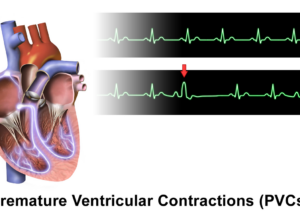
PVC stands for premature ventricular contraction.
It creates the illusion of an extra heartbeat, especially if there are two or three in a row.
And sometimes, it feels as though the heart has skipped a beat. This makes some people believe they’re about to have a heart attack.
Frequent premature contractions can produce tremendous anxiety.
“A PVC is a premature ventricular contraction, which means the beat is originating in the ventricle, not the atria (normal site of origin),” explains Yaser Elnahar, MD, a cardiologist with Hunterdon Cardiovascular Associates in NJ.
“Rare [occasional] PVC’s are very common and are not dangerous.
“Frequent PVC’s or runs of PVC’s can be very dangerous or even fatal when it becomes ventricular tachycardia.
“If a person has frequent premature ventricular contractions or runs of PVC’s, the cardiologist usually tries to make sure there are no blocked arteries as the cause. If the arteries are fine then we look for other causes.”
Below are links to articles about PVCs with answers from cardiologists.
Do you experience heart palpitations that literally go on for hours?
Does this occur on an almost daily — or even everyday — basis?
Dr. Pilar Cohen discusses the very unnerving nature of daily heart thumps that last hours.
Do you lift weights or do some form of strength training?
If so, have you felt your heart flutter or go ba-boom during a set?
It’s one thing to have heart palpitations prior to a big lift — the anxiety of performing the lift safely, or, the excitement of possibly pulling off your personal best in that deadlift — can make your heart flutter.
But what if you’ve been detecting palpitations in the midst of a weightlifting set? Dr. Ronald Scheib discusses this problem.
Ever notice that sometimes when you have a PVC episode, it makes you cough?
There’s actually a reason for this; it’s not your imagination, and it’s explained by Dr. Sameer Sayeed.
PVCs are frightening because they can make you think you’re about to have a heart attack.
Or, they can make you wonder if your heart’s going to stop beating any moment, and the fluttering is just its way of conking out, kind of like a car engine sputtering before it goes dead.
But let’s get to the bottom of this. Can a premature ventricular contraction cause a heart attack?
Or can a palpitation be a warning that a heart attack is coming?
Dr. David N. Smith discusses PVCs and heart attacks.
 Dr. Elnahar has publications in the Journal of Atrial Fibrillation, the Journal of Clinical Medicine and Research, Reports in Medical Imaging, and more.
Dr. Elnahar has publications in the Journal of Atrial Fibrillation, the Journal of Clinical Medicine and Research, Reports in Medical Imaging, and more.
 Lorra Garrick has been covering medical, fitness and cybersecurity topics for many years, having written thousands of articles for print magazines and websites, including as a ghostwriter. She’s also a former ACE-certified personal trainer.
Lorra Garrick has been covering medical, fitness and cybersecurity topics for many years, having written thousands of articles for print magazines and websites, including as a ghostwriter. She’s also a former ACE-certified personal trainer.
.





































